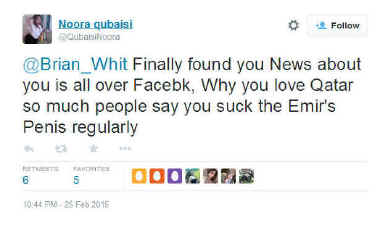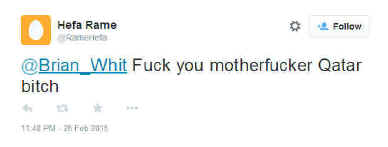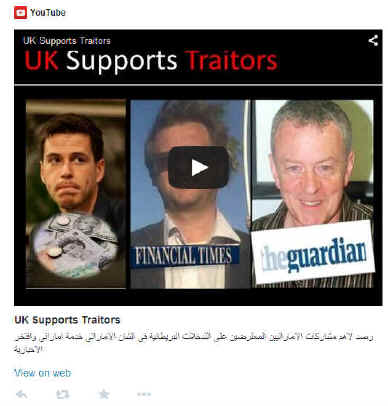As regular readers will know, some odd things have been happening since I raised questions about the Global Network for Rights and Development (GNRD), an organisation registered in Norway which has links to the United Arab Emirates and takes an unusually favourable view of the UAE's human rights performance.
I have also raised questions about another Emirati-linked "human rights" group, the Swiss-based International Gulf Organization (IGO), which earlier this month attacked Human Rights Watch over its criticisms of the UAE.
The GNRD file
Read the full story here
It was a couple of days after my most recent blog post about GNRD that the weird things began. The details are here and here but, just to recap:
-
Someone created a fake Facebook profile using my name and photograph.
-
My own Facebook account was suspended after someone complained that I was using a false name.
-
Someone attempted to hack into my Twitter account.
-
A Twitter account called @Media_intel began making false claims about me. One of its tweets said I was being paid $50,000 a year by Qatar; another said I had been expelled from Yemen for a sexual offence.
-
The claims were then retweeted by hundreds of fake Twitter accounts.
Interestingly, these same fake accounts had been used earlier to mass-tweet links to a speech by Loai Deeb, the president of GNRD. This leads me to believe that whoever organised or paid for the promotion of Deeb's speech through fake accounts also organised or paid for the retweeting of @Media_intel's claims.
Now for a brief update.
-
Someone has set up a fake Twitter account in my name (@BrianWhitak). This hasn't been very active so far but it includes some tweets copied from my real Twitter account (@Brian_Whit).
-
During a periodic check of the statistics for my website I found there had been 52,300 page views last Friday and 27,638 on Saturday. As far as I'm aware, both these figures are far higher than I have ever had before on a single day. Daily traffic to the website is usually in the range of 3,000-4,000 page views and doesn't fluctuate much. I can't see any explanation for this surge in traffic except, perhaps, as an attempt to crash the website.
-
Several new Twitter accounts have begun posting about my imagined connection with Qatar.

... and another:

I have also received emails thanking me for subscribing to websites that I haven't subscribed to. One was a dating website; the other was bayt.com, a job-search website. Someone has created a fake profile/CV at bayt.com which uses my photograph (below) and says I am looking for employment in Qatar.

I was particularly intrigued by the photograph of myself. It has appeared only a handful of times on the internet and I don't recall when or where it was taken, but I do remember the last time I saw it.
The same picture was used in a Tweet by @emarati001 in 2012 when I was still working at the Guardian and the paper came under attack from the UAE:

The photograph also figured in a Twitter campaign (accompanied by a YouTube video) under the hashtag #uk_supports_traitors:

The main cause of the 2012 campaign against the Guardian was an article by Said Nasser al-Teniji, an Emirati Islamist, published on the paper's website. The online abuse was directed mainly against me and Ian Black, the Guardian's Middle East editor, even though neither of us had played any part in the publication of Teniji's article.
Ian Black referred to this later in a Guardian article about
the UAE's sensitivies:
"The Emirati authorities ... do not take negative publicity lying down. A recent comment piece in the Guardian by an Islah activist has attracted particular venom. The fightback in Abu Dhabi has been fast and abusive. Under a Twitter hashtag #UK_supports_traitors the Guardian and BBC have been accused of being in the pay of the Qataris; knowledge of Arabic is produced as evidence of involvement in 'espionage'. Harassed foreign office diplomats are being forced to explain that the British government does not control the British press.
"But the campaign is wider than that. The UAE has been lobbying hard in both Washington and London against their 'honeymoon' with the new regimes of the Arab spring, with special emphasis on Egypt. It is perhaps over-stating the case to call this effort a Gulf 'counter-revolution' but the Cold War notion of 'containment' certainly fits the bill."
If I were to ask Emirati officials about this online harassment I'm sure they would deny it has anything to do with their government. They would probably attribute it to over-zealous Emirati citizens who feel slighted by criticism of their country.
What puzzles me, though, is why Emiratis specifically would indulge in such crude behaviour. I have probably said critical things about every country in the Middle East at some time or other and the reactions have been varied, but I have seen nothing from other countries in the region quite like this.
Posted by Brian Whitaker
Thursday, 26 February 2015

 RSS Feed
RSS Feed
